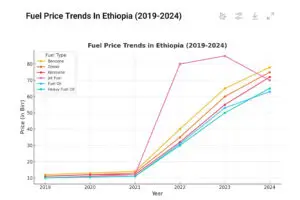Fueling Ethiopia: How Government Policies Shape the Gas Station Business.
The gas station business in Ethiopia plays a pivotal role in keeping the country’s economy moving. From fueling vehicles to powering machinery, the availability and pricing of fuel impact everything from transportation costs to consumer goods. Behind this crucial industry lies the influence of government policies, which shape how gas stations operate and how fuel reaches consumers. This article delves into how Ethiopian government policies impact the gas station business, highlighting key regulations, their effects, and opportunities for the future.
1. Regulated Fuel Prices: A Double-Edged Sword
In Ethiopia, fuel prices are regulated by the government. This system ensures that fuel remains affordable for the general population, especially in a country where a large portion of the population relies on public transportation. However, price regulation comes with its own set of challenges:
Impact on Gas Station Margins: Gas station operators work with fixed profit margins determined by the government. While this system protects consumers, it limits the profitability of gas station businesses, making it challenging to invest in improvements, expand operations, or introduce new technologies.
Market Inflexibility: Fixed prices make it difficult for station owners to adjust to fluctuations in global oil prices, exchange rates, or local supply chain costs. As a result, operators must absorb additional costs during times of economic instability.
2. Fuel Subsidies: Benefiting Consumers but Straining the System
The Ethiopian government provides subsidies on certain fuel types, particularly diesel and kerosene, to support essential sectors such as agriculture and transportation. While subsidies are designed to reduce costs for consumers and industries, they can also create unintended consequences:
Fuel Shortages: Subsidized fuel often leads to higher demand, and in some cases, shortages at gas stations. This forces station owners to deal with frustrated customers and operational disruptions.
Black Market Activity: Fuel subsidies sometimes encourage illegal activities, such as fuel smuggling or resale on the black market. This diverts fuel away from legitimate stations, impacting their business operations.
3. Licensing and Regulatory Frameworks
Operating a gas station in Ethiopia requires adherence to strict licensing and compliance requirements. These policies aim to ensure safety, environmental protection, and fair competition. However, navigating these regulations can be challenging for station owners:
High Entry Barriers: Obtaining permits for new stations involves substantial bureaucracy and costs, which can deter smaller investors or new entrants into the market.
Compliance Costs: Gas station owners must invest in infrastructure and safety measures to meet regulatory standards, which can strain budgets, particularly for smaller operators.
4. Infrastructure and Supply Chain Challenges
The Ethiopian government has made strides in improving infrastructure, but challenges remain in ensuring a consistent fuel supply to gas stations, especially in rural areas:
Transportation Costs: Ethiopia’s landlocked geography means fuel must be imported via ports in neighboring countries, such as Djibouti. The cost of transportation and logistical inefficiencies often affect supply reliability.
Rural Access: Government policies have focused on expanding fuel access to underserved regions. However, many rural gas stations struggle with intermittent supply and higher operating costs, limiting their ability to meet demand.
5. Opportunities for Growth and Reform
Despite the challenges, government policies also present opportunities for innovation and growth within Ethiopia’s gas station industry:
Investment in Infrastructure: Recent government initiatives to improve road networks and fuel storage facilities are helping to address supply chain issues. Gas station owners can capitalize on these improvements to expand operations.
Public-Private Partnerships (PPPs): The government is increasingly encouraging partnerships with private investors to modernize the fuel distribution network. These partnerships can help introduce modern technologies, such as automated tank monitoring systems and payment solutions, to enhance efficiency.
Transition to Renewable Energy: With global attention shifting toward sustainability, there is an opportunity for Ethiopian gas stations to explore renewable energy solutions, such as solar-powered stations or electric vehicle (EV) charging points. Government support for green initiatives could pave the way for this transformation.
Conclusion
Government policies in Ethiopia are a cornerstone of the gas station industry, balancing affordability for consumers with operational challenges for station owners. While price regulation and subsidies aim to protect the public, they also create obstacles that require innovative solutions. By addressing supply chain inefficiencies, streamlining regulatory processes, and encouraging private investment, the Ethiopian government can help unlock the full potential of the gas station business. For station owners and managers, staying informed about policy changes and leveraging opportunities for growth will be key to thriving in this evolving landscape.
Do you operate a gas station? You can use Gas Pro, the first gas station management software in Ethiopia, to get these benefits:
Automated Tank Monitoring
Using Gas Pro, you can automatically measure your tank at the press of a button. This saves you time while increasing your measurement accuracy
Real-Time Fuel Level Alerts
Gas Pro will give “low fuel alerts” when the fuel reaches critical level and “fuel tank full” alerts when they fill up. This enables gas station owners and managers to coordinate supply of fuel.
Theft and Loss Prevention
Gas Pro’s dual-level sensors detect theft or tampering, reducing financial losses. Accurate records of fuel deliveries prevent disputes with suppliers.
Remote Pricing Control
Gas Pro enables you to remotely adjust the prices on your gas pumps thus increasing your ability to react to price changes made by the government.
More Stories

Operational Inefficiencies in the Ethiopian Gas Station Industry
Manual dipstick measurements and inventory tracking are labor-intensive, error-prone, and time-consuming. These methods often result in inventory discrepancies, which can lead to financial losses and operational disruptions.

Keeping the Pumps Running: Tackling Supply Chain Challenges in Ethiopia’s Fuel Market
Fuel is the lifeblood of any economy, powering everything from transportation and agriculture to industrial production. In Ethiopia, a nation undergoing rapid growth and development, the demand for fuel is rising steadily. Yet, ensuring a consistent and affordable fuel supply remains a formidable challenge.

From Addis to Rural Ethiopia: Bridging the Fuel Access Gap
Bridging the fuel access gap between Addis Ababa and rural Ethiopia will require concerted efforts from all stakeholders, from government officials to private investors. With the right policies, infrastructure investment, and technological innovation, Ethiopia can ensure that all its citizens—regardless of where they live—have equal access to the fuel they

The Future of Fuel: Opportunities and Growth in Ethiopia’s Gas Station Market
Ethiopia’s gas station market is at the cusp of transformation, and for those looking to invest, the future offers plenty of opportunities to drive growth and innovation. Whether you’re an entrepreneur looking to build your brand or an investor seeking profitable ventures, this is a sector worth watching.

Rising Prices, Rising Challenges: Navigating Fuel Costs in Ethiopian Gas Stations
Fuel prices are a central concern for gas station owners, operators, and consumers across Ethiopia. As a country that imports the majority of its petroleum products, Ethiopia is highly sensitive to global oil price fluctuations, foreign exchange availability, and government-imposed pricing regulations.

Fueling Ethiopia: How Government Policies Shape the Gas Station Industry
The gas station business in Ethiopia plays a pivotal role in keeping the country’s economy moving. From fueling vehicles to powering machinery, the availability and pricing of fuel impact everything from transportation costs to consumer goods.
